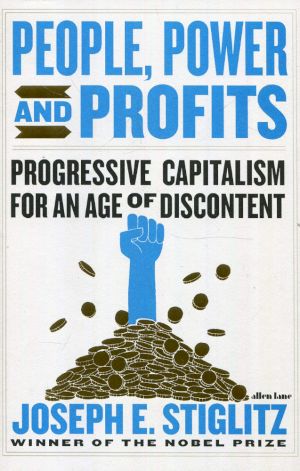25 July 2019
People, Power and Profits:
Progressive Capitalism for an age of Discontent
Joseph Stiglitz
2019, Allen Lane, 247 pages,
ISBN 9780241399231
Reviewer: Rosemary Connell

The first part of this engaging book details how Capitalism has lost its way. The second half deals with reconstructing capitalism for an age of discontent. It provides some radical prescriptions for the way forward. The main focus of the book is the USA and the policies of its presidents with a focus on Trump.
The 2008 financial crisis showed capitalism to be neither efficient nor stable. Anti-establishment votes raised questions about democracy. In the USA some minorities currently rule over majorities, which is clearly undemocratic.
Pervasive inequality (not just in income) is blamed for many of the economic problems. It is argued that rising GDP alone does not reduce inequality as the so called trickle-down effect does not work. The pursuit of profit may involve a deteriorating environment and depleted resources. The US economy has become heavily concentrated leading to increasing market power of big corporations and a weakening of the power of employees.
To create wealth and increase productivity, Investment in physical capital and basic research and technology is key. It is argued that the banks have exploited the system with their short- term pursuit of profits from, for example, M&A, tax avoidance schemes, financing share buybacks and so on. This short- termism has helped to prevent long term investment in people technology and other assets. Banks have tended to become rent seekers rather than wealth creators.
The problems of artificial intelligence are discussed, for example the polarisation of the labour force, manipulation of elections and media.
It is argued that a strong and effective government must regulate to make markets work for the good of all, but ensuring government is a force for good is a challenge for democracy. The power of money in politics clearly needs to be curbed to achieve this.
To restore growth and create a better, more equal society the author suggests that Progressive Capitalism is necessary with strict antitrust laws, financial regulation, higher taxes especially on carbons, and upon those who can pay. Investment in education and health care should follow along with infrastructure and research investment. Trump’s attacks on various institutions are seen as worrying and counterproductive.
It is clear that politics must be reformed before economic changes can be implemented. It is not thought too late to save capitalism from itself given the author’s alternative vision of the future. However, this vision is markedly different to that of Trump and the Republican Party.
